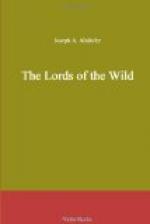“They went back toward the sawmill and presently they heard a terrible cry of rage, a cry given for the fallen warrior.
“I don’t think I shall ever grow used to such yells,” said Grosvenor, shuddering.
“I’ve never grown used to ’em yet,” said Robert.
The shout was followed by a half dozen shots, and a bullet or two whistled overhead, but it was clear that all of them had been fired at random. The warriors, aware that the chance of surprise had passed, were venting their wrath in noise. Willet suddenly raised his own rifle and pulled the trigger. Another dusky figure sprang up and then fell prone.
“They were coming too close,” he said. “That’ll be a warning. Now back, lads, to the breastwork!”
As they retreated the shots and yells increased, the forest ringing with the whoops, while bullets pattered on the stumps. Both Grosvenor and Robert were glad when they were inside the logs once more, and Colden was glad to see them.
“For all I knew you had fallen,” he said, “and I can’t spare you.”
“We left our mark on ’em,” said the saturnine Black Rifle. “They know we’re waiting for ’em.”
The demonstration increased in volume, the whole forest ringing with the fierce whoops. Stout nerves even had good excuse for being shaken, and Colden paled a little, but his soul was high.
“Sound and fury but no attack,” he said.
Willet looked at him approvingly.
“You’ve become a true forest leader, Captain Colden,” he said. “You’ve learned to tell the real rush from the pretended one. They won’t try anything yet a while, but they’re madder than hornets, and they’re sure to move on us later. You just watch.”
Yet Colden, Wilton and the others were compelled to argue with the men, especially with the boat builders and wood choppers. Stern military discipline was unknown then in the forest; the private often considered himself a better man than his officer, and frequently told him so. Troops from the towns or the older settled regions seemed never to grow used to Indian methods of warfare. They walked again and again into the same sort of ambush. Now, they felt sure, because the Indian fire had evaporated in scattered shots, that the French and the warriors had gone away, and that they might as well be asleep, save for the guards. But Colden repressed them with a stern hand.
“If it hadn’t been for our experience at Fort Refuge I might feel that way myself,” he said. “The silence is certainly consoling, and makes one feel that all danger has passed.”
“The silence is what I dread most,” said Robert. “Is anything stirring on the lake?”
“Not a thing,” replied Wilton, who had been watching in that quarter. “I never saw George look more peaceful.”
Robert suggested that they go down to the shore again, and Wilton, Grosvenor and he walked through the camp, not stopping until they stood at the water’s edge.




